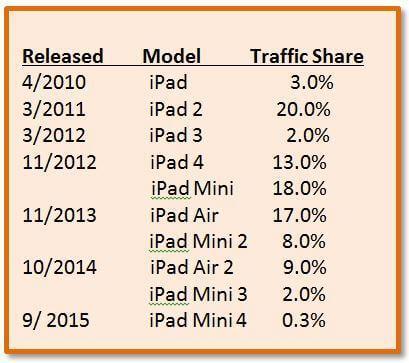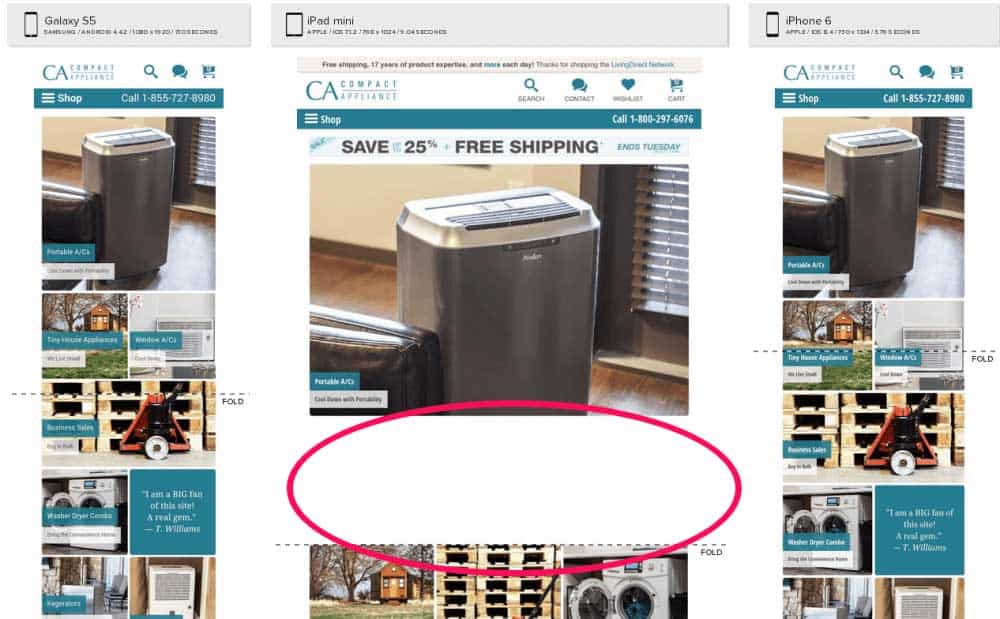You must choose and choose right. Upon your stout shoulders rests a momentous decision: which mobile devices will you target for testing?
You don’t want an iPad testing fail, for instance, due to neglect of older models that are still very much in use.
Yes, ensuring an optimal mobile user experience is critical to your business and brand, but frankly it’s impossible to quickly scan, much less fully test, your website on all mobile devices. The sheer volume of phones and tablets is simply mind-boggling, easily surpassing the 24,876 distinct models.
Testing Strategy 1: Follow the Crowd?
So choose you must. One way to choose (and thereby seek to test on devices with the largest market share) is to follow the crowd, and by crowd, I mean those hordes of consumers who line up in a white-heat of desire and craving (the kind God probably was thinking of when he issued his final commandment in the big ten) at Apple’s doors whenever there is a new release.
Take, for example, the iPhone 6s and 6s Plus issued on September 25, 2015. The first day of release was accompanied by the usual round-the-block lines of buyers, more media attention than even Donald Trump can command and adulating reviews. Consumers scooped up 13+ million handsets in just the opening weekend. The power of the brand and the eagerness of early adopters were such that 42% of buyers conducted zero research before making their hefty outlay for the slim phone.
So best to ride the wave of fashion and ensure your user interface is optimized for the latest and greatest while leaving older versions to fade away in rapid obsolescence, right?
Wrong! For a handful of key devices, legacy models continue to grab a greater share of traffic than later editions.
Mobile Testing & Legacy Devices: The Case of iPads
Not every latest generation phone or tablets surpasses the previous generation in use. Old standbys sometimes outweigh later generations. This is especially true for Apple.
What! Apple??? The shiny macintosh of Steve Jobs’ eye? The tech innovator that knocks our socks off with every new release?
Yes! Sure, iPad remains the dominant brand among US tablets, taking 56.42 % of the traffic in 2015. Older iPads, however, continue to hold onto a significant share of the market. They command the loyalty of users more than the latest releases.
As Localytics declares, “Early adopters have not been kind to iPads the way they have been to iPhones. The iPad Mini 4, which was released on September 9, 2015, had just a 0.2% adoption rate in its first month.”
Here is Localytics’ data on market share as of November 2015:

What are the implications for testing?
Testing Strategy 2: Market Share, Not Latest Releases
Older iPads remain a significant source of traffic and therefore your team should test your website’s performance on these earlier generation devices. For this reason, Mobilizer’s online testing lab features an iPad Mini, which has the same hardware and software configuration as the iPad 2 and thus covers 38% of the iPad traffic.
But iPads are not the only legacy devices that you need to test on to ensure a winning mobile experience. In major markets, also Samsung Galaxy S3, HTC’s One M7 and the iPhone 5s are also major sources of web traffic.
The lesson is clear. Among the many complexities of mobile testing (complexities Mobilizer works to eliminate with its easy, fast access to accurate online testing), legacy models must not be discounted or ignored. When customers hold onto the previous generations, marketing, web development and UX teams must follow to ensure a polished user experience, sparkling revenues and an untarnished reputation for their brand.

A website’s poor display on the iPad Mini (and also iPad2).
- Can you trust Chrome’s Emulator for your responsive design testing? - January 26, 2018
- Mobile Emulators – The Very Real, Unhappy Truth - January 25, 2018
- 8 Reasons Why You Need Responsive Design Testing - January 17, 2018
